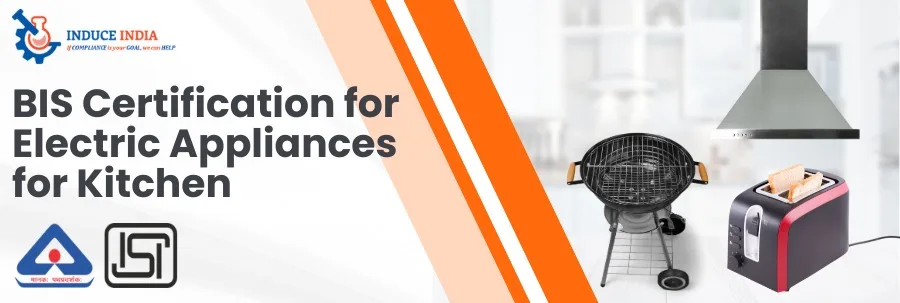In this blog, we will understand what BIS certification means, how to obtain it and the significance of the BIS certification. We’ll also cover the process for getting BIS certification, the compulsory use of the Standard Mark with the importance of compliance.
BIS Certification for Electrical Appliances for Kitchen
The BIS certification is essential to ensuring the safety, quality, and reliability of electrical appliances used in kitchens. BIS certification is a mark of quality and safety for products sold in India. For kitchen electrical appliances, this certification ensures that the products meet the necessary safety and performance standards. This is crucial for protecting consumers from potential hazards such as electrical shocks, short circuits, and fires, etc.
QCO for Electrical Appliances for Kitchen
The Quality Control Order (QCO) is a directive issued by the Indian government mandating that specific products, including kitchen electrical appliances, must conform to BIS standards. This ensures that all products available in the market are safe for consumer use and maintain a consistent quality level.
A Quality Control Order was published on 5th March, 2024 by the MINISTRY OF COMMERCE AND INDUSTRY (Department for Promotion of Industry and Internal Trade) to make BIS Certification mandatory for Electric Appliances for Kitchen.
Implementation date of Quality Control Order (QCO) for Electrical Appliances for Kitchen
(1) This order may be called the Electrical Appliances for Kitchen (Quality Control) Order, 2023.
(2) It shall come into force on the expiry of six months from the date of publication of this notification in the Official Gazette.
- For large scale and foreign manufacturers, this order shall come into force with effect from 6 months from the date of publication of this QCO.
- For small enterprises, it shall come into force with effect from 9 months from the date of publication of this notification and.
- For micro enterprises, it shall come into force with effect from 12 months from the date of publication of this QCO.
Download the full Quality Control Order here.
Compulsory Use of Standard Mark
For many electrical kitchen appliances, using the BIS Standard Mark (ISI mark) is mandatory. This mark signifies that the product complies with Indian standards and has undergone rigorous testing and inspection. It is illegal to sell products that fall under the mandatory certification category without BIS license. If any manufacturer or importer who violates the terms of this order will be subject to penalties under the BIS Act of 2016.
Products Covered in QCO for Electric Appliances for Kitchen
| Goods or articles | Indian Standard | Title of Indian Standard |
| (1) | (2) | (3) |
| Electrical Appliances for Kitchen | IS 302 (Part 2/Sec 9): 2009 | Safety of household and similar electrical appliances – particular requirements – toasters, grills, roasters and similar appliances |
| IS 302 (Part 2/Sec 31): 2009 | Safety of household and similar electrical appliances – particular requirements – range hoods |
Advantage of BIS Certification on Electrical Appliances for Kitchen
BIS certification offers several advantages for manufacturers and customers:
- Safety Assurance: Ensures that the products are safe to use, reducing the risk of accidents.
- Consumer Trust: Builds trust among consumers, who can be confident in the quality and reliability of certified products.
- Market Access: Certified products meet regulatory requirements, facilitating easier entry into the Indian market.
- Competitive Edge: Enhances the brand’s reputation, giving a competitive advantage over non-certified products.
Process for BIS Certification for Electrical Appliances for Kitchen
The process for obtaining BIS certification involves several steps and the BIS process is different for Domestic manufacturers and foreign manufacturers or importers. Here is a general overview of the BIS process for Electric Appliances for Kitchen:
- Identification of Standards for the product being certified
- Preparation of Documents: Gather all necessary documents including application forms, test reports, and quality management system details.
- Submission of Application to the BIS website portal.
- Scrutiny of Documents.
- Sample Testing: Submit the product samples for testing at a BIS-recognized lab.
- Audit by BIS officer on manufacturing premises
- Grant of License: Upon successful review, BIS grants certification and the right to use the Standard Mark.
Conclusion
Obtaining BIS certification for electrical appliances for kitchen is essential to guaranteeing both product quality and consumer safety. By adhering to BIS standards, manufacturers can gain consumer trust, meet regulatory requirements, and enhance their market presence. Following the outlined process and complying with the compulsory use of the Standard Mark ensures that your products are both safe and competitive. Prioritizing BIS certification not only benefits consumers but also promotes higher industry standards.



